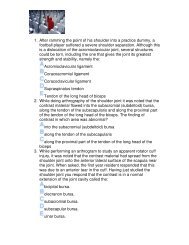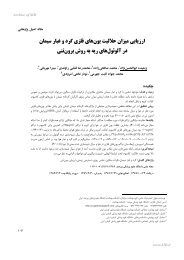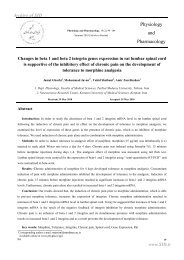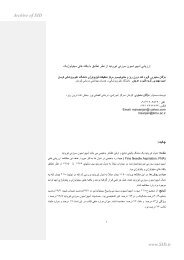Evidence-based Medicine Toolkit
Evidence-based Medicine Toolkit
Evidence-based Medicine Toolkit
You also want an ePaper? Increase the reach of your titles
YUMPU automatically turns print PDFs into web optimized ePapers that Google loves.
Appraising qualitative studies 61d Was the sample size justified?e Is it clear why some participants chose not to take part?Qualitative research usually aims to reflect the diversity within agiven population. Research that relies on convenience samples,particularly when the group of interest was difficult to access, willmake it difficult to relate the findings to other settings. If you cannotrelate your findings to the population you are interested inthen you should consider whether it worth continuing.Purposive (or theoretical) sampling offers researchers a degreeof control rather than being at the mercy of any selection biasinherent in pre-existing groups (such as clinic populations). Withpurposive sampling, researchers deliberately seek to include ‘outliers’conventionally discounted in quantitative approaches.What was the researcher’s perspective, and has this beentaken into account?There is no way of abolishing, or fully controlling for, observer biasin qualitative research. This is most obviously the case when participantobservation is used, but it is also true for other forms ofdata collection and of data analysis. Data generated by techniquessuch as focus groups or semi-structured interviews is likely to beinfluenced by what the interviewer believes about this subject andby whether he or she is employed by a clinic, the local authority,or a charity group etc. It is inconceivable that the interviews couldhave been conducted by someone with no views at all and noideological or cultural perspective. Researchers should thereforedescribe in detail where they are coming from so that the resultscan be interpreted accordingly.What methods did the researcher use for collecting dataand are these described in enough detail?The methods section of a qualitative paper may have to be lengthysince it is telling a unique story without which the results cannotbe interpreted. Large amounts of data may be collected. Thesemay include verbatim notes or transcribed recordings of interviewsor focus groups, jotted notes and more detailed ‘field-notes’ ofobservational research, a diary or chronological account, and theresearcher’s reflective notes made during the research. The settingis important, for instance patients interviewed in hospital will be










